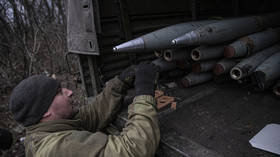US struggling to track Ukraine aid – Politico

The administration of US President Joe Biden is turning to the blockchain and other tech-based solutions amid mounting calls for oversight of over $50 billion in aid pledged to Ukraine this year, according to a State Department cable seen by Politico on Wednesday.
Reportedly signed by the US Ambassador to Kiev, Bridget Brink, on September 6, the nine-page “sensitive but unclassified” document laments that “kinetic activity and active combat between Ukrainian and Russian forces creates an environment in which standard verification measures are sometimes impracticable or impossible.”
The State Department declined to comment on the document's contents, merely stating that it “takes very seriously our responsibility to ensure appropriate oversight of all US assistance.”
Washington’s options for imposing order on uncontrollable spending in Ukraine reportedly include “a commercial smartphone app that uploads all photo and video media onto a blockchain at the point of capture,” delegating equipment inspections to the Ukrainian military in the absence of Western contractors willing to work in “high-risk” areas, and requiring photographic proof that aid has been received, especially in “hard to reach areas.” The use of management consultants to “review [and] identify gaps” in oversight was also recommended.
With members of both parties demanding stricter oversight of taxpayer funding to Kiev, Washington is reportedly assembling a dedicated program focused solely on overseeing aid to Ukraine under the heading MEASURE (Monitoring, Evaluation and Audit Services for Ukraine Reporting). This will apparently operate alongside the many inspectors general tasked with overseeing aid spending for the Pentagon, State Department, USAID and other agencies.
Politico’s cable sets out a March timeline for MEASURE’s launch, with a three-year contract.
Earlier this month, Nigerian president, Muhammadu Buhari, alerted other regional leaders that western weapons earmarked for Ukraine had reportedly surfaced in the hands of militant groups in the African Sahel. Interpol head Jurgen Stock has warned as far back as June that weapons sent to Ukraine would likely “be trafficked not only to neighboring countries but to other continents.”
Even when aid shipments make it to the Ukrainian military, they are often used to illegally attack civilians, especially in the absence of US or international oversight, University of Pittsburgh human rights professor Daniel Kovalik told the UN Security Council earlier this month.
Russia’s envoy to the UN, Vassily Nebenzia, last week warned the US and its allies that there would be “concrete legal repercussions” for those who supplied the weapons used by Kiev in criminal acts.













